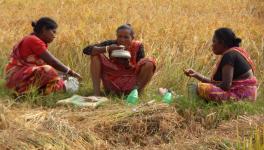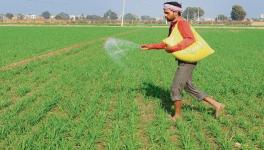Few, But Strong: The Women Farmers at Rajasthan-Haryana Border
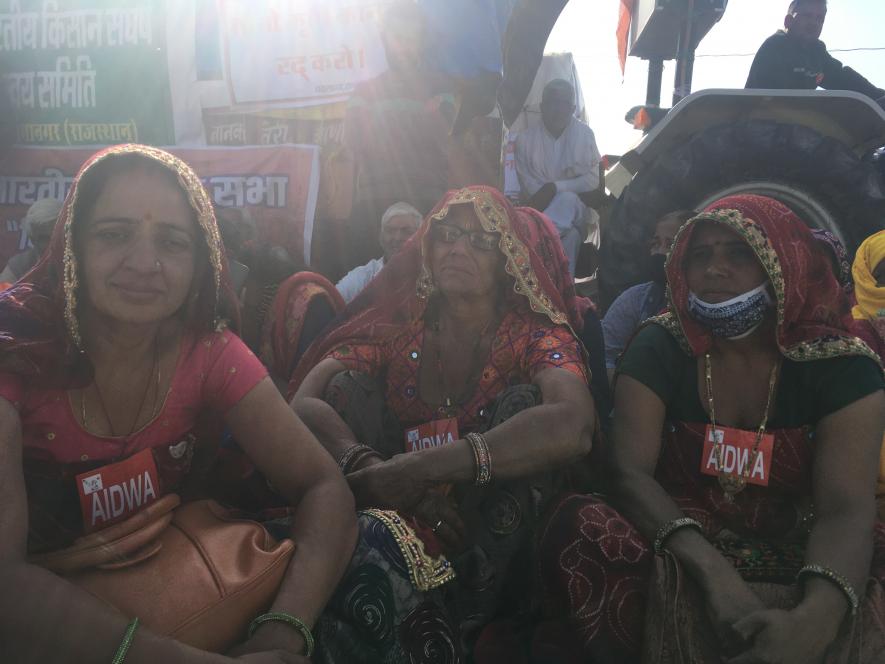
Shubhita Nehra (left) with other women farmers who arrived at Rajasthan-Haryana to protest against the controversial farm laws. Image clicked by Ronak Chhabra
Shahjahanpur/Alwar: All day and night long, Shubhita Nehra’s time is consumed by chores -- feeding the household cattle, milking them, turning their dung into fuel cakes, and labouring in the field among other things. She has no day off. “I wake up at around 5 in the morning and never go back to sleep before 11 in the night. In between, I also take care of my family,” she said. By ‘family’, she meant her husband, in-laws, and a “little” daughter. The family owns about 30 bigha of tilling land in Pratappura village in Rajasthan’s Sikar district.
However, on Monday, the 34-year old, who is also a member of All India Democratic Women Association (AIDWA), “took a break” from her hard-laboring schedule. “We decided to come today to the Rajasthan-Haryana border,” Nehra, clad in a red saree, said while introducing a group of ten women. They have come there to participate in the farmers’ protest at the NH-8 expressway that connects Jaipur to Delhi.
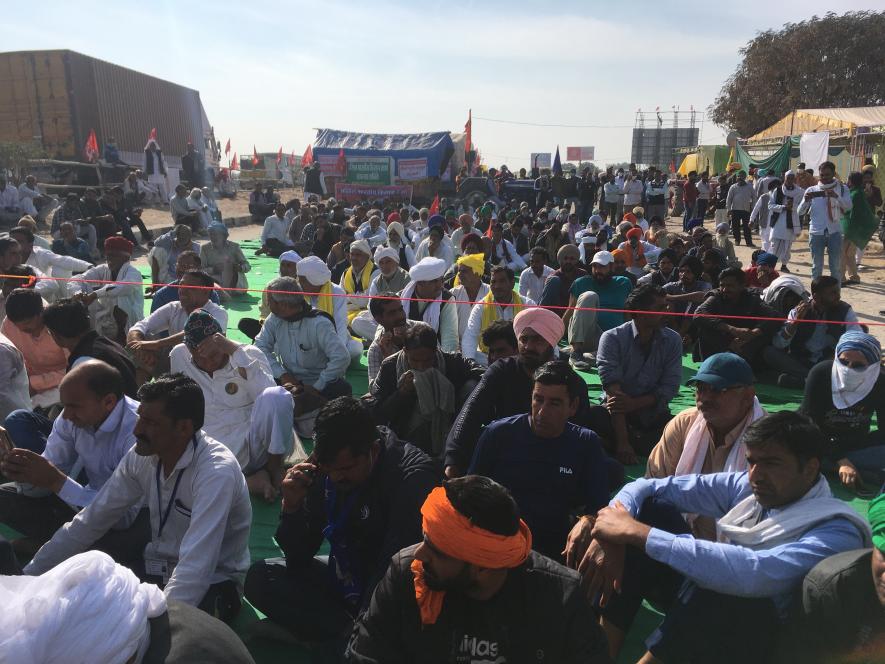
Monday marks the ninth day of farmers’ sit-in protest at the interstate borders of Rajasthan-Haryana. Image clicked by Ronak Chhabra
![]()
“We are also farmers and we know what these kaale kaanoon will do to farming. Now that we have come, we will stay put here till the laws are repealed,” she told NewsClick. Nehra’s resolve was shared by others who claimed that they have come prepared for a long haul.
As the farmers’ agitation at the outskirts of the national capital -- four key entry-exit points -- completes a month and keeps on swelling in terms of its participation, multiple groups of women from Punjab and Haryana are joining in. Started only in mid-December, the sit-in protest at Rajasthan-Haryana interstate border is seeming to be no less different.
Tara Dhayal, 50, from Nehra’s group, said, “The incomes of the farming families have been declining for years now. We women do equal labour on fields along with the men of the house and yes, we know the pain of selling the crop produce at an amount that is less than what is deserved.” Dhayal, whose family owns 10 bigha of land, which is sowed with wheat, chana, and bajra, among others, depending on the season, reiterated the demand of “legalising the minimum support price.”
“A farmer is selling at half the rate and then buying at double. We are on the fields and in the kitchen - who would know the burden of this reality better than us,” she said.
The women present at the site to make their voices heard are also making sure to bring the focus on how other policies of the Narendra Modi-led central government have affected their life.
“The new law that is supposed to protect the cattle in villages has only added to our woes,” said Shubhita Bhichar, 35. She was referring to the central government’s May 2017 ban on sale of cattle for slaughtering, especially cows, purportedly to preserve the indeginous breed.
“Ever since then, stray cattle have increased in the village. They would enter the fields and eat our crops. Due to all these, a farmers’ cost has only increased as now we are required to spend a lot on the fencing of the land.” she said.
The women from Rajasthan were also joined by another group of women hailing from Haryana’s Rewari district. Suman, 45, who goes by only first name, told NewsClick that she does “everything” related to farming on her family’s 5 kila (acre) land which involves “fasal ki buayi, safai, aur katai.”
Even after all the hard work, Suman complains that it is increasingly becoming difficult to only sustain on farming. “First of all, a farmer wouldn’t get good price in the market. Then, even whatever is earned by the total produce, my husband uses most of it in purchasing liquor,” she said.
Phoolbati, 60, knows this ordeal well as she herself has given up on her husband and his liquor habit. “The government must also ban liquor so that the money that a farmers’ family makes goes into the welfare of its members,” she said.
Pushpa Sharma, AIDWA Rajasthan state committee member, told NewsClick that village to village mobilisation is currently going on to ensure more women participate in protests in the days to come. “In 2005 protests also, women from Rajasthan came forward in large numbers,” she said. Sharma was referring to the protests against the then Vasundhara Raje’s government in the state who decision to hike electricity tariffs had triggered statewide protests. “This time too if the protest continues, the women won’t stay quiet.”
As the protest site is looking for more female participation, with it also comes the challenges of making their stay possible with required arrangements.
Rani Duggal, 40, from Gharsana, who has been here with her husband and daughter since over a week and has been engaged in langar services, told NewsClick that a hotel nearby has provided its premises to the protesters in exchange of nothing.
The name of the hotel is “Hotel Veer” that is not farther than 500metres from the main stage at the protest site. Tejpal Singh, 29, the owner of the place said that every day, around 20 women visit the hotel to bathe and change clothes. A separate room has been allocated for the purpose. Apart from this, sleeping arrangements have also been done in a hall that can accommodate up to 20 individuals.
Asked to explain the reasons behind his help, Singh said: “I am also the son of a farmer and I know what difficulties a farming family goes through. I am with the protesters and I am ready to take losses for them -- even for more days.”
While the hotel is mostly used by women from Rajasthan, those from Haryana are doing a daily up-down from their nearby villages.
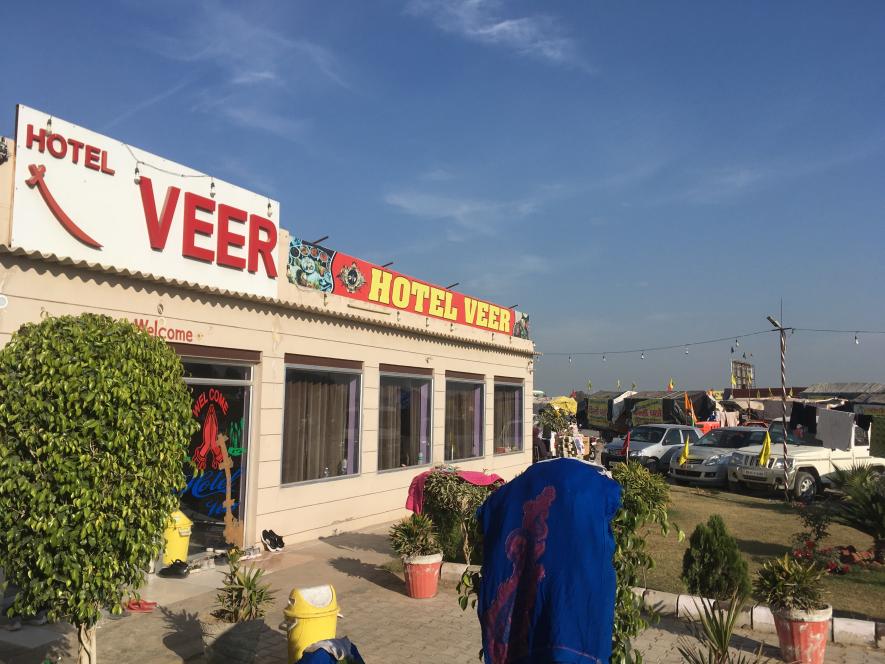
Situated at the Delhi-Jaipur highway, Hotel Veer has provided its premises for the women protesters. Image clicked by Ronak Chhabra
While women’s participation here is visible, it is not that those who have not come here are not supporting the protests. They are engaged in the farming back home, ensuring that the men stay put in the protest.
Bhupinder Singh, 55, from Hanumangarh district in Rajasthan, said that he could come to the protest only because of his wife who is currently taking care of the wheat crop on his 15 bigha land. “She is first a farmer and then my wife. She is currently taking care of the land and the children. She is also taking part in the mobilisation activities of the All India Kisan Sabha,” he said. Singh said he will stay at the borders for another 10 days and then leave, and his wife will then come to join the protest.
Sunita, 35, from Rewari, also told that more women from Haryana will join the protests. “Gai-bakri ki dekhbaal hum aurtoon ko karni padti hai; agar jyada din tak rukna pada idhar toh unhe bhi sath hi lekar aa jayenge (We women have to look after the cows and goats; if we have to stay here for longer, we will bring the cattle here too.”
Get the latest reports & analysis with people's perspective on Protests, movements & deep analytical videos, discussions of the current affairs in your Telegram app. Subscribe to NewsClick's Telegram channel & get Real-Time updates on stories, as they get published on our website.














